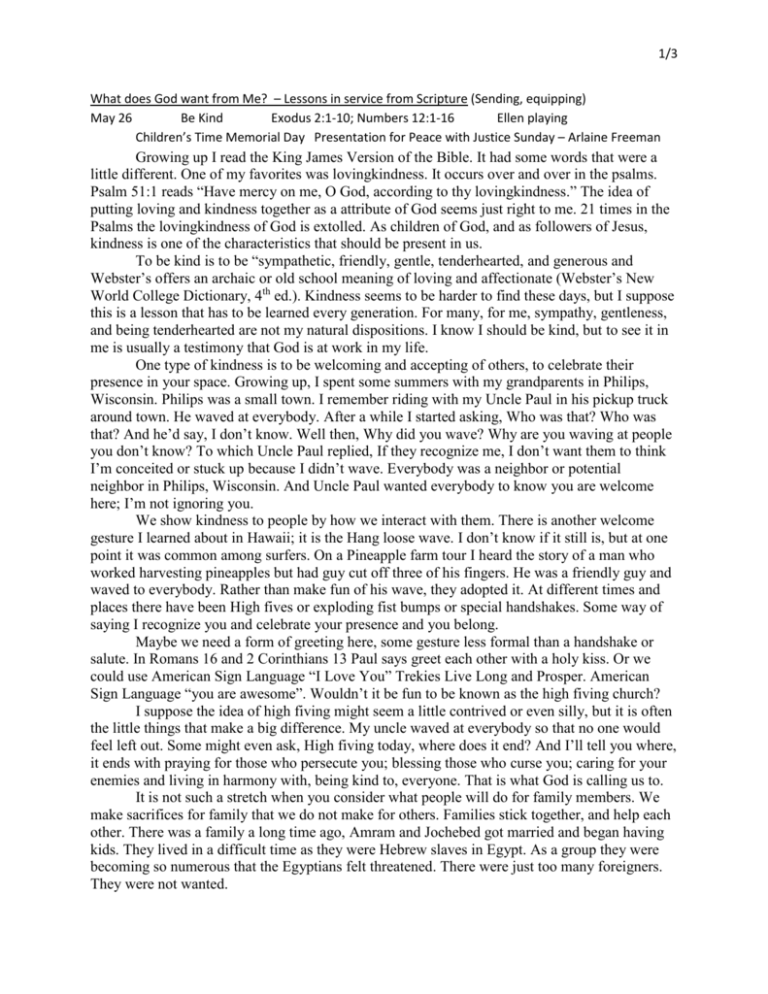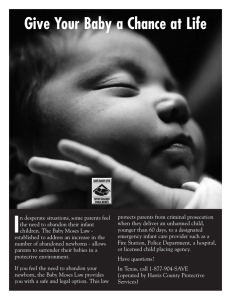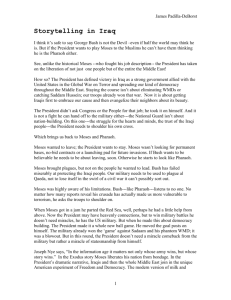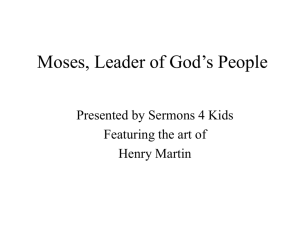05-26-13-What-doe-God-want-from-me-Be
advertisement

1/3 What does God want from Me? – Lessons in service from Scripture (Sending, equipping) May 26 Be Kind Exodus 2:1-10; Numbers 12:1-16 Ellen playing Children’s Time Memorial Day Presentation for Peace with Justice Sunday – Arlaine Freeman Growing up I read the King James Version of the Bible. It had some words that were a little different. One of my favorites was lovingkindness. It occurs over and over in the psalms. Psalm 51:1 reads “Have mercy on me, O God, according to thy lovingkindness.” The idea of putting loving and kindness together as a attribute of God seems just right to me. 21 times in the Psalms the lovingkindness of God is extolled. As children of God, and as followers of Jesus, kindness is one of the characteristics that should be present in us. To be kind is to be “sympathetic, friendly, gentle, tenderhearted, and generous and Webster’s offers an archaic or old school meaning of loving and affectionate (Webster’s New World College Dictionary, 4th ed.). Kindness seems to be harder to find these days, but I suppose this is a lesson that has to be learned every generation. For many, for me, sympathy, gentleness, and being tenderhearted are not my natural dispositions. I know I should be kind, but to see it in me is usually a testimony that God is at work in my life. One type of kindness is to be welcoming and accepting of others, to celebrate their presence in your space. Growing up, I spent some summers with my grandparents in Philips, Wisconsin. Philips was a small town. I remember riding with my Uncle Paul in his pickup truck around town. He waved at everybody. After a while I started asking, Who was that? Who was that? And he’d say, I don’t know. Well then, Why did you wave? Why are you waving at people you don’t know? To which Uncle Paul replied, If they recognize me, I don’t want them to think I’m conceited or stuck up because I didn’t wave. Everybody was a neighbor or potential neighbor in Philips, Wisconsin. And Uncle Paul wanted everybody to know you are welcome here; I’m not ignoring you. We show kindness to people by how we interact with them. There is another welcome gesture I learned about in Hawaii; it is the Hang loose wave. I don’t know if it still is, but at one point it was common among surfers. On a Pineapple farm tour I heard the story of a man who worked harvesting pineapples but had guy cut off three of his fingers. He was a friendly guy and waved to everybody. Rather than make fun of his wave, they adopted it. At different times and places there have been High fives or exploding fist bumps or special handshakes. Some way of saying I recognize you and celebrate your presence and you belong. Maybe we need a form of greeting here, some gesture less formal than a handshake or salute. In Romans 16 and 2 Corinthians 13 Paul says greet each other with a holy kiss. Or we could use American Sign Language “I Love You” Trekies Live Long and Prosper. American Sign Language “you are awesome”. Wouldn’t it be fun to be known as the high fiving church? I suppose the idea of high fiving might seem a little contrived or even silly, but it is often the little things that make a big difference. My uncle waved at everybody so that no one would feel left out. Some might even ask, High fiving today, where does it end? And I’ll tell you where, it ends with praying for those who persecute you; blessing those who curse you; caring for your enemies and living in harmony with, being kind to, everyone. That is what God is calling us to. It is not such a stretch when you consider what people will do for family members. We make sacrifices for family that we do not make for others. Families stick together, and help each other. There was a family a long time ago, Amram and Jochebed got married and began having kids. They lived in a difficult time as they were Hebrew slaves in Egypt. As a group they were becoming so numerous that the Egyptians felt threatened. There were just too many foreigners. They were not wanted. 2/3 Pharaoh’s solution was to have the midwives kill every male child at the moment of birth. As soon as they figured out it was a boy, the midwives were supposed to end the life, but they feared God more than Pharaoh. They let the babies live. It didn’t take long for Pharaoh to notice all the baby boys still around so the second decree came down. Throw all the baby boys in the Nile River. Can you imagine trying to hide your baby, having him discovered and forcibly taken away? This was the law as Amram and Jacobed had baby Moses. Jacobed hid Moses for three months, but when she could hide him no longer she had to cast Moses into the river, so she did – but first she built a basket of reeds, a little ark, coated it with pitch, and then put Moses into the river. His older sister, Miriam watched from the distance as the basket floated downstream to where a daughter of Pharaoh was bathing. She saw the basket, opened it and found a crying baby, and had a choice to make. So I ask you, “Who was the hero in this story? Who was acting in the way that pleased God?” Who showed kindness? No doubt, the daughter of Pharaoh knew the command from her father to kill all the baby Hebrew boys. No doubt there were others there with her who knew this as well. But she chose to be kind. She chose life for this baby. Moses’ sister Miriam came to her and asked if she could fetch a midwife to care for the child and Jacobed ends up being paid to care for him until he was old enough to be turned over. Pharaoh’s daughter took him as her son, she named him Moses. She gave him a place in her family. Can you think of a better example of kindness than adopting a child and caring for it as one of your own? Moses’ family took risks to save him. Pharaoh’s daughter took risks to save him. Their kindness cost them something, but life was given and protected. Moses got two families. We live in a world of disruption and upheaval. According to the Census Bureau 40 million people move annually. Julia and I have lived in 11 different homes or apartments in our 30 years of marriage. The church has been our family in the midst of relocation after relocation. We have experienced kindness and acceptance time after time from the family of God. People have helped us helped us and encouraged us in so many ways. Charles Harrell and I have been talking about a ministry for St Paul of caring for each other. I am so thankful for his work with us offering pastoral care, but we would like to do more with helping us be family to each other by having shepherding groups, where one person or couple agrees to stay in regular contact with several families, offering an immediate layer of support when needed. So many of us are away from family and alone, this will be an opportunity to care for each other. When Moses came back to Egypt many years later he was reunited with family. His brother Aaron and sister Miriam were a part of the leadership team. They worked together. God provided his family so that they could support one another. “One another” is a frequently used term in the New Testament. Thirteen times we find the instruction “Love one another” and there are many other sentences with the same emphasis: wash one another’s feet, be devoted to one another in brotherly love, honor one another above yourselves, live in harmony with one another, accept one another just as Christ accepted you, greet one another with a holy kiss, have equal concern for one another, serve one another in love, in all there are 59 verses, so I could go on and on. This is a constant instruction to love each other in the family of God and dare I say in the family of all people. Lovingkindness is the attitude and action God wants from us as we live in this world together. It won’t always be easy and we will fail at times, just as it wasn’t always easy for Moses and Aaron and Miriam. In Numbers 12:1-16 Aaron and Miriam criticized Moses’ new wife. Scripture does not tell us what happened to Zipporah, Moses’ first wife, but there is a new wife, 3/3 a foreigner, a Cushite. Miriam and Aaron do not agree with this and they challenge Moses’ authority as he speaks for God. There is conflict in the family. God steps in and puts an end to the fighting, but notice Moses’ response in all of this. Moses is the example of kindness, and forgiveness; he prays to God for Miriam’s healing and restoration to the community. Even though he has been attacked he is humble and kind. The church is one big blended family and we can’t survive without kindness and forgiveness. What is more, we live in a country where nuclear families – mom and dad and kids under 18 all in the same household represent only 23.5% of all households. The Baltimore Sun reported in 2010 that in Baltimore only 8.6% of households are nuclear families. The church is a blended family and as such, we have something to offer modern families – the lovingkindness of God. God wants us to be kind, to be humble, to serve and to accept each other. The key to kindness is seeing people as part of our family. As we react to any situation from our own point of view, it is easy to be selfish and unkind. But if we will take the time and effort to check our initial response, and consider the kindness and acceptance God gives to us to share with others, our responses will be more loving and kind and helpful. I have a placard in my office on the wall. I bought it because it speaks to me: Be kind, for everyone you meet is fighting a great battle (Philo of Alexandria). If we take the time to learn even some of the situation, we will see things in a different light. God invites us to be more sympathetic, friendly, gentle, tenderhearted, and generous as we reflect the lovingkindness that flows from God. What does God want from us? God wants us to adopt each other as our own. God wants us to welcome each other as if we are family. God wants us to respect and forgive and pray for each other. God wants us to be kind, so that everyone will know we are Christians by our love.





